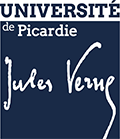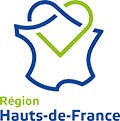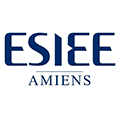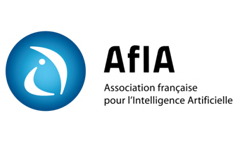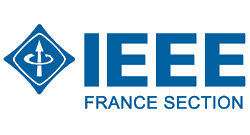Programme
Programme Détaillé - Jeudi 19 PDF
Programme Détaillé - Vendredi 20 PDF
| Jeudi 19 octobre | ||
|---|---|---|
| 8:45 – 9:15 | Accueil des participants | |
| 9:15 – 9:30 | Session d’ouverture | |
| 9:30 – 10:30 | Conférence invitée : Susana Vieira Université Technique de Lisbonne, Portugal | |
| Pause Café | ||
| 11:00 – 12:30 | 1.1 Fonctions de croyance | 1.2 Bases de données |
| Déjeuner | ||
| 14:00 – 16:30 | 2.1 Apprentissage automatique | 2.2 Agrégation et fusion d’informations |
| Pause Café | ||
| 17:00 – 18:00 | 3.1 Fonctions de croyance | 3.2 Commande floue |
| 18:30 – 19:30 | Visite de la cathédrale d’Amiens | |
| 20:00 | Dîner de la conférence | |
| Vendredi 20 octobre | ||
|---|---|---|
| 9:30 – 10:30 | Conférence invitée : Carl Frélicot Université de La Rochelle | |
| Pause Café | ||
| 11:00 – 12:30 | 4.1 Comparaisons | 4.1 Commandes Floues |
| Session de clôture et déjeuner | ||
Programmes détaillés
| Jeudi 19 octobre | ||||||||||||
|---|---|---|---|---|---|---|---|---|---|---|---|---|
| 8:45 – 9:15 | Accueil des participants | |||||||||||
| 9:15 – 9:30 | Session d’ouverture | |||||||||||
| 9:30 – 10:30 | Conférence invitée : Susana Vieira - Université Technique de Lisbonne, Portugal
Fuzzy Systems in Health Care |
|||||||||||
| Pause Café | ||||||||||||
| 11:00 – 12:30 | 1.1 Fonctions de croyance
|
1.2 Bases de données
|
||||||||||
| Déjeuner | ||||||||||||
| 14:00 – 16:30 | 2.1 Apprentissage automatique
|
2.2 Agrégation et fusion d’informations
|
||||||||||
| Pause Café | ||||||||||||
| 17:00 – 18:00 | 3.1 Fonctions de croyance
|
3.2 Commande floue
|
||||||||||
| 18:30 – 19:30 | Visite de la cathédrale d’Amiens | |||||||||||
| 20:00 | Dîner de la conférence | |||||||||||
| Vendredi 20 octobre | ||||||||||
|---|---|---|---|---|---|---|---|---|---|---|
| 9:30 – 10:30 | Conférence invitée : Carl Frélicot - Université de La Rochelle
Quelques travaux sur la similarité dans [0,1] |
|||||||||
| Pause Café | ||||||||||
| 11:00 – 12:30 | 4.1 Comparaisons
|
4.1 Commandes Floues
|
||||||||
| Session de clôture et déjeuner | ||||||||||
Conférenciers invités
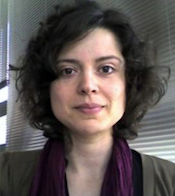
Susana Vieira
CIS – IDMEC-IST, Technical University of Lisbon, Portugal
Data accumulates in a speed unmatchable by human capacity of data processing. Thus, approximation of unknown functions from sampled data is an important activity in modern modeling and systems theory. It is important to develop models from data, which have sufficient generalization power and can describe the underlying process with accuracy, despite the nonlinearity and the complexity of these processes. Fuzzy systems are known to be universal function approximators that can be used to model real-world systems. Further, they have the additional advantage that the generated models can be interpreted in linguistic terms.
Health care is one of the areas where data has been growing exponentially. Improving quality, safety or clinical effectiveness as well as reducing costs are nowadays the main concerns for health care decision-makers. These are challenging problems and the structure or design of a system may influence the outcome, and is likely to be more significant in high-acuity, complex environments such as intensive care units (ICUs). Patients here are among the sickest patients in the hospital, and decisions that are made can literally mean the difference between life and death.
In clinical decision support systems, it is crucial to interpret the developed models by: determining which attributes are chosen by the artificial intelligence techniques and what is their clinical significance; propose alternative procedures or develop criteria for classifying patients into patient sub-group; and designing a post-implementation assessment of how well the system meets the goals.
Fuzzy modelling can have an important role in health care as it can provide a transparent description of the system that reflects the nonlinearity of the system. The rule-based nature of the models allows for a linguistic description of the knowledge captured in the model. It can also help the identification of important factors or features that identify specific groups of patients within a specific clinical setting, The design of specific decision models, will support clinicians’ decisions in terms of identifying the most suitable therapy for a specific patient in the ICU, in order to achieve more favourable clinical outcomes and preventing poor outcomes due to practice variation.
Susana Vieira received the MSc and PhD degrees both in Mechanical Engineering (Mec. Eng.) in 2005 and 2010, respectively, from Instituto Superior Técnico (IST), University of Lisbon, Portugal. She was a Teaching Assistant at IST, in Mec. Eng., from 2005 to 2006 and in 2009, she was an Invited Teacher at the Erasmus University of Rotterdam, the Netherlands. Since 2012 she is an invited assistant professor at IST, University of Lisbon and a Senior researcher at the Center of Intelligent Systems (CIS), IDMEC- IST.
Her main research area is Soft Computing, more specifically she works in feature selection, fuzzy modeling, fuzzy optimization and metaheuristics. Her research focuses mainly on the development of computational intelligence methods for knowledge data discovery. Recently these methods are being used to identify important factors or features that lead to unfavorable or favorable clinical conditions of patients in Intensive Care Units, and design specific decision models that support clinicians’ decisions.
She has authored or coauthored 20 peer reviewed journal papers, 8 book chapters, and more than 60 conference papers in the field of computational intelligence.

Carl Frélicot / Mathématiques, Image et Applications (MIA), Université de La Rochelle
La comparaison de situations, d'objets, de modèles, etc, est au coeur du raisonnement humain et par conséquent une thématique fondamentale en intelligence artificielle. On y associe naturellement la notion de similarité (et de dissimilarité) qui intervient dans de nombreux processus d'extraction de connaissances et de prise de décision, en particulier à partir de données. Le raisonnement humain est fondé sur l'agrégation (ou fusion) d'éléments d'information. Depuis plusieurs décennies, des principes et des outils, théoriques et pratiques, ont été développés pour appréhender cette opération empreinte d'imprécision et/ou d'incertitude. Les cadres mathématiques actuels sur lesquels ils reposent, par leur souplesse, permettent de définir des opérateurs (ou fonctions) d'agrégation plus génériques, qui s'avèrent mieux adaptés au traitement d'informations plus complexes ou correspondant à des situations plus délicates. La logique floue en est un. Nous présentons quelques travaux sur l'utilisation (de familles) d'opérateurs d'agrégation issus de la logique floue et leur combinaison permettant de définir des mesures de similarité dans [0,1]. Les domaines d'applications potentiels sont nombreux, comme par exemple : la classification supervisée et non supervisée, le traitement d'images, la décision multi-critères. Certains seront abordés lors de l'exposé.
Docteur de l'Université de Technologie de Compiègne en 1992, Carl Frélicot intègre la naissante Université de La Rochelle en 1993 en qualité de Maître de Conférences. Il y passe son Habilitation à diriger des Recherches en 2002 et anime l'équipe de recherche en reconnaissance des formes du L3i (Laboratoire d'Informatique – Image – Interaction). Nommé Professeur en 2004, il dirige le Département d'Informatique, puis participe en 2007 à la création du MIA (Mathématiques – Image et Applications) dont il est Directeur-Adjoint jusqu'en 2014. Membre de la communauté francophone sur la Logique Floue, Carl Frélicot a participé à la première édition de LFA. Ses activités de recherche concernent principalement les opérateurs d'agrégation et les statistiques d'ordre appliqués à la reconnaissance des formes, le traitement et l'analyse d'images et de vidéos.

